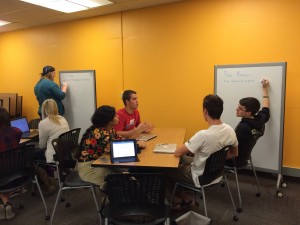Understanding the Divide: Academic Research and Our Students
 by Lizz Zitron and Amy Stewart-Mailhiot
by Lizz Zitron and Amy Stewart-Mailhiot
There is often a sizable divide between what students actually know and their perception of what they know. There is an equally sizable divide between students’ high school academic experience and their college one. Both of these divides can lead to frustration for faculty and students. For example, papers are poorly-cited and full of suspect sources. Yet students honestly believe they understand the ethics of using sources and feel they know exactly where to find credible information. Faculty wonder, “Didn’t they learn this in high school?”
The PLU librarians have been exploring these divides through quantitative and qualitative research studies that examine student research confidence and experiences. We hope to better understand our students in order to serve them better. We also hope faculty can use our data to more effectively craft assignments based on both student perception and actual experience. For example, our students think they know how to properly cite sources, yet examining actual bibliographies tells us this is still a struggle for them.
We worked with Credo, an academic publisher, to survey PLU students about their research confidence in fall 2014. Students were invited to participate through social media and targeted emails. One hundred and seventy-two PLU students responded and answered questions about their confidence in conducting research activities. Overall, students rated themselves as “Confident” or “Very Confident” in completing research tasks such as finding sources, evaluating sources, citing sources, etc. The survey showed a definite contradiction when it came to students’ confidence in their skills. For example, students answered that they felt confident in their ability to correctly cite a source but many also answered that citing sources was stressful. Students conveyed that they felt confident using library database, but also expressed that they did not always know where to find sources. Detailed results can be viewed in our UHouse presentation.
 It’s important to note that our students are not unique in over reporting their capacity to “do research.” In the survey conducted by Credo, our students did not significantly differ from students at other institutions. National data echo our students’ research experiences and habits. If you would like more information about the research habits of young adults in higher education settings, consult the excellent, large-scale projects available from Project Information Literacy.
It’s important to note that our students are not unique in over reporting their capacity to “do research.” In the survey conducted by Credo, our students did not significantly differ from students at other institutions. National data echo our students’ research experiences and habits. If you would like more information about the research habits of young adults in higher education settings, consult the excellent, large-scale projects available from Project Information Literacy.
All of this got us thinking about our first year students. Anecdotally, we see them struggle with the expectations of college level research. We also believe that many of their high school experiences have not prepared them for academics at PLU. In an effort to gather baseline information on the new FY cohort, we collected data at New Student Registration from 154 new Lutes on their confidence level and high school experiences in conducting research tasks. Like their upper class peers, the majority of New Lutes rated themselves as Confident or Very Confident in performing the various steps in the research process (e.g. choosing a topic, searching databases, evaluating sources). In spite of their high reports of confidence, few of the first year students we have seen during library sessions this fall know how to tell if a source is scholarly and have limited experience using library databases.
While many of our new students bring experience in using public or school libraries, it’s worth highlighting that web search engines, class texts, web sites, and instructors are their favorite sources for research. The sources many professors expect students will use, such as librarians and library databases, are not their go-to sources.
We are using the data to inform how to frame our instruction sessions — helping students connect their high school experiences to the expectations of college and helping them fill in the gaps they did not realize existed. Our research will continue throughout the year, as we explore how students’ research confidence changes over the course of their first year.
We encourage faculty to learn more by visiting Project Information Literacy, which examines the information literacy habits of college students. We also encourage faculty to meet with a librarian when developing research assignments. And we recommend using an instructional designer to help faculty design appropriate, effective instruction.


